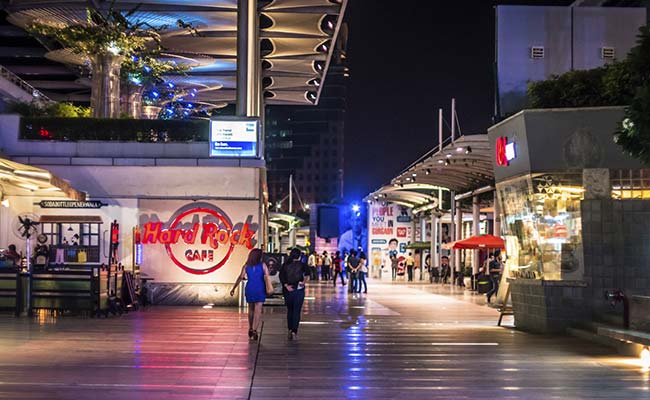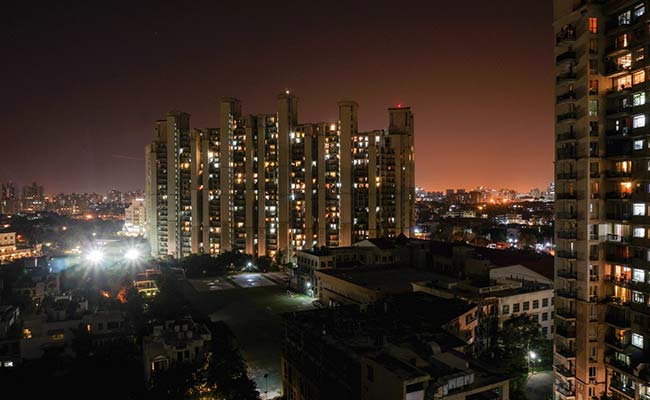
Haryana Chief Minister Manohar Lal Khattar certainly knows the pulse of the people of the state: he believes that if you go backwards, you are going forward and in doing so will achieve his party's ultimate goal - Ram Rajya. So after banning cow slaughter and making Bishnoi Brahmins a backward community needing reservations along with Jats, he has now renamed Gurgaon as "Gurugram". This is an absolute stroke of genius as it captures the imagination of all right-thinking Hindus (in the larger RSS sense of those with the cultural values of Bharat) since it proudly proclaims itself as the land of the Bhagavad Gita.
And here is how I see the future unfold.
On Monday, the Rashtriya Gita Sangh (RGS, a Parivaar off-shoot) will immediately demand that the 600 hectares which is the DLF Golf Club be allocated to them for building the Gita Temple and the Geeta University. In pursuit of this, the RGS needs the state government to act as soon as possible so that work can begin before Ram Navami next year. The design of the temple will be in consultation with all high-ranking godmen (no shortage of those) so as to capture the original architecture of that lost period; it is certain that there will be no arches and domes, as the key stone technology was not a Bharat thing.
The RGS will warn the state government that if no action is taken, it will start an agitation and block all roads to Gurugram and Delhi. Following this threat, the Khattar Cabinet has to meet and issue an ordinance declaring the DLF Golf Club a Holy Land, and order it be handed over to the RGS with immediate effect.
 Not to be left behind, the All Bharat Vegetarians Association, based in Nagpur, will decree that that if Gurugram is to be a temple town like Haridwar, then it is concomitant on the Haryana Government to declare Haryana a meat-free zone. After meeting the Association in early May 2016, Mr Khattar will conclude, "It is a well-known fact that Hindus did not eat meat, and this carnivorous activity was only spread by foreigners." He will therefore immediately agree to ban all meat in Gurugram. The Gurugram Restaurant and Dhabha Association will advise its members to follow this diktat or close down (forcibly, if not voluntarily).
Not to be left behind, the All Bharat Vegetarians Association, based in Nagpur, will decree that that if Gurugram is to be a temple town like Haridwar, then it is concomitant on the Haryana Government to declare Haryana a meat-free zone. After meeting the Association in early May 2016, Mr Khattar will conclude, "It is a well-known fact that Hindus did not eat meat, and this carnivorous activity was only spread by foreigners." He will therefore immediately agree to ban all meat in Gurugram. The Gurugram Restaurant and Dhabha Association will advise its members to follow this diktat or close down (forcibly, if not voluntarily).
Many restaurateurs, fearing the worst, will contact Gujarati restaurant owners to buy them out. However, the Gujarat Federation of Restaurateurs will not agree to the bail out unless Haryana implements shuddh vegetarianism and bans the use of garlic and onions. In part because of the belief that these two additives create heat in the body of people and lead to terrible desires. They will emphasize that such a ban will decrease local consumption and allow the government to export these crops and earn foreign exchange for the country.
The instant approval of this, in May 2016, by the district administration, will shock the considerable Punjabi community in Gurgaon. Along with expats, they may decide to put up their flat for sale. Between May and July 2016, prices of property in Gurgaon will crash, while those in Bengaluru with its variety of craft-beer breweries will sky rocket. (Karnataka will then consider a ban on sale of property to Punjabis over fears that the native population will be reduced to a minority.)
 The Haryana Government, in an effort to shore up prices, will then appeal to vociferous Bharat Mata ki Jai Associations in the US, Canada and UK to buy property in Gurgaon. Unfortunately, deafening silence. As one NRI will put it (anonymously), it's fun to tweet Hindutva, but not so easy to go back and live it. But he will add, sipping his single malt, if Khattar visits the Superdome, he can be assured of a rousing reception.
The Haryana Government, in an effort to shore up prices, will then appeal to vociferous Bharat Mata ki Jai Associations in the US, Canada and UK to buy property in Gurgaon. Unfortunately, deafening silence. As one NRI will put it (anonymously), it's fun to tweet Hindutva, but not so easy to go back and live it. But he will add, sipping his single malt, if Khattar visits the Superdome, he can be assured of a rousing reception.
The collapse of housing prices in Gurgaon will impact the shares of building companies and with that, banks, because experts will (belatedly) point out that banks' exposure to these developers and their projects was vast. Banks will write off the debts. Next, a recession.
Factories in Gurugram, the holy land, will shut down. No taxes means the government can't pay salaries. With no work and no money the people of Bharat will move to the villages near Gurugram.
And once again, it will be the villages of India that will sustain the people. Living the simple life of rising at dawn and sleeping at dusk, eating local produce, and sipping gaumootru to keep away the malaria and dengue.
And all the call centres in the land will fall silent. And the makeover of Gurugram from Millennium City to the ancient times will be complete.
(Ishwari Bajpai is Senior Advisor at NDTV)
Disclaimer: The opinions expressed within this article are the personal opinions of the author. The facts and opinions appearing in the article do not reflect the views of NDTV and NDTV does not assume any responsibility or liability for the same.
And here is how I see the future unfold.
On Monday, the Rashtriya Gita Sangh (RGS, a Parivaar off-shoot) will immediately demand that the 600 hectares which is the DLF Golf Club be allocated to them for building the Gita Temple and the Geeta University. In pursuit of this, the RGS needs the state government to act as soon as possible so that work can begin before Ram Navami next year. The design of the temple will be in consultation with all high-ranking godmen (no shortage of those) so as to capture the original architecture of that lost period; it is certain that there will be no arches and domes, as the key stone technology was not a Bharat thing.
The RGS will warn the state government that if no action is taken, it will start an agitation and block all roads to Gurugram and Delhi. Following this threat, the Khattar Cabinet has to meet and issue an ordinance declaring the DLF Golf Club a Holy Land, and order it be handed over to the RGS with immediate effect.

Gurgaon's famous CyberHub - a weekend hangout place with many restaurants and pubs
Many restaurateurs, fearing the worst, will contact Gujarati restaurant owners to buy them out. However, the Gujarat Federation of Restaurateurs will not agree to the bail out unless Haryana implements shuddh vegetarianism and bans the use of garlic and onions. In part because of the belief that these two additives create heat in the body of people and lead to terrible desires. They will emphasize that such a ban will decrease local consumption and allow the government to export these crops and earn foreign exchange for the country.
The instant approval of this, in May 2016, by the district administration, will shock the considerable Punjabi community in Gurgaon. Along with expats, they may decide to put up their flat for sale. Between May and July 2016, prices of property in Gurgaon will crash, while those in Bengaluru with its variety of craft-beer breweries will sky rocket. (Karnataka will then consider a ban on sale of property to Punjabis over fears that the native population will be reduced to a minority.)

High-rise apartments in Gurgaon
The collapse of housing prices in Gurgaon will impact the shares of building companies and with that, banks, because experts will (belatedly) point out that banks' exposure to these developers and their projects was vast. Banks will write off the debts. Next, a recession.
Factories in Gurugram, the holy land, will shut down. No taxes means the government can't pay salaries. With no work and no money the people of Bharat will move to the villages near Gurugram.
And once again, it will be the villages of India that will sustain the people. Living the simple life of rising at dawn and sleeping at dusk, eating local produce, and sipping gaumootru to keep away the malaria and dengue.
And all the call centres in the land will fall silent. And the makeover of Gurugram from Millennium City to the ancient times will be complete.
(Ishwari Bajpai is Senior Advisor at NDTV)
Disclaimer: The opinions expressed within this article are the personal opinions of the author. The facts and opinions appearing in the article do not reflect the views of NDTV and NDTV does not assume any responsibility or liability for the same.
Track Latest News Live on NDTV.com and get news updates from India and around the world

